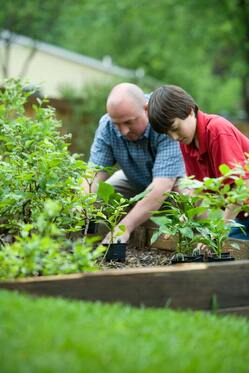 Photo by Annie Spratt on Unsplash Photo by Annie Spratt on Unsplash With everything that has been going on, I completely forgot that two weeks ago was the three-year anniversary of the When I Was 17 series! Three years of interviews about people’s winding career paths, explorations into how our ideas of professional life have evolved, and countless conversations with students at the beginning of their own journeys to satisfying work. It feels particularly nice to celebrate something at this time. And as is the case when you dive deeply into anything, I’ve started to look at the world through this lens of professional development. I’ve been struck repeatedly over the past month by how quickly things can change, watching as favorite restaurants close, people start wearing masks to the grocery store, and the weekly unemployment numbers continue to climb. I’ve always cautioned my students against trying to predict what kinds of careers and fields will be in demand by the time they graduate from college, but that seems even more impossible now than it was before. But there’s a positive side to all this change as well. This crisis is shining a light on professions that might not have been as well known before. Suddenly, my aspiring med school students aren’t just talking about pediatrics and oncology and surgery; they’re discussing epidemiology and public health when they think about their futures. My business students are suddenly hearing the phrase “supply chain” more than ever before and exploring supply chain management programs at their schools. And my education majors are thinking about the long-term reality of online learning and its benefits and drawbacks. And it’s not just bringing attention to less well-known fields within medicine and business and education. There is also new demand for certain careers that didn’t exist before. For instance, per the Washington Post, CDC director Robert Redfield stated that we “need to massively scale up [our] ability to identify the infected and find everyone they interact with through contact tracing.” In order to do this, Johns Hopkins Center for Health Security and the Association of State and Territorial Health Officials estimates that we will need to hire and train “100,000 more contact tracers are needed than are in the states now.” And former CDC director Tom Frieden says that the number of contact tracers might need to be as high as 300,000. That’s hundreds of thousands of new jobs that we did not know we needed a few months ago. That’s just a drop in the unemployment bucket right now, but it’s one example of the way work will be impacted and will continue to change while we face this crisis. I’m encouraging my students – and myself – to stay flexible; to try to see new openings that weren’t there before; to try not to predict what will happen next but to respond to what is happening. So much has changed in my own career over the last three years, and I can only imagine that the next three years will be even more impactful. What I do know is that I will still be exploring these issues and asking these questions and sharing all of it with you.
0 Comments
 Photo by Jon Tyson on Unsplash Photo by Jon Tyson on Unsplash On Wednesday, the College Board announced that they were officially canceling their June SAT administration. We haven’t heard anything similar from the ACT yet, but it seems likely that they will make a similar move in the next few days or weeks. June had originally been positioned as a time for students to make up their canceled March and May SAT sittings. With all three spring administrations now canceled, students have significantly fewer opportunities to prepare for, take, and retake these widely required standardized tests. Many of us in the college admissions world are watching to see how colleges react to this new barrier for students. So far, 35 schools, including Loyola Marymount, University of Oregon, and the University of California system, have announced that they will be test-optional for students applying this fall. They join the 1,000+ colleges who had already adopted a test-optional or test-flexible policy on their campuses. Throwing out yet another curveball, the College Board and ACT have mentioned that online versions of their tests will be available as soon as this fall. I’m not a huge fan of this idea, namely because they almost certainly have not had a chance to review the accuracy and validity of the online versions, let alone come up with necessary accommodations for students with learning differences or limited access to technology and Wi-Fi. I’ll be keeping an eye on how next month’s online, at-home AP tests go for a sense of what students can expect this fall. But the big question my students are asking is what test-optional really means and whether they should change their application plans. “Optional” is a bit of a loaded word in college applications. Some schools recommend but do not require SAT subject tests. Some schools include optional supplemental essays in their applications. And whole sections of the Common App, like the Additional Information section, are optional. Many of my students don’t know what to make of these choices and whether they should submit something. (For the record, you should submit subject test scores if they are good, you should always write optional supplemental essays, and using the Additional Info section depends on your individual situation). So how optional are standardized tests at these test-optional schools? Test-optional simply means that if you submit scores, they will be considered with your application. If you don’t, they will make a decision based on the rest of your application - your transcripts, extracurricular involvement, essays, and letters of rec. I’m still recommending that my students prepare to take either the SAT or the ACT if it becomes available in the summer or the fall. That way, students will have scores that they can submit if they are within or above the median 50% score range for a particular school; this will likely give them an admissions boost and greater access to scholarships. And if the scores are not within that range, they just won’t submit them. Like many elements of college admissions, these new test-optional policies will benefit kids with access to online tutors, reliable technology, and the financial security to register for and reschedule their test dates. And it will likely disadvantage the same students who come into this process already facing barriers. While it’s important to point out the inequities that inevitably result from sweeping changes to the application process, I also want to acknowledge and thank the colleges who are trying to simplify this year’s applications and straightforwardly remove a requirement that many students will have difficulty fulfilling. In this instance, optional truly does mean optional, and students should feel confident submitting their applications without test scores.  Photo by shraga kopstein on Unsplash Photo by shraga kopstein on Unsplash Last week, my colleague Meg shared a post that caught my attention: “Just an FYI for students who aspire to medicine - Dr. Anthony Fauci majored in Classics before he went to medical school. (Students often think they must study biology to become doctors).” As a fellow Classics major, I was charmed by this and filed this detail away for future reference. Then, this week, the topic came up with one of my students while we were discussing her college list. One of the schools she had researched talked in-depth about their commitment to providing an interdisciplinary learning experience. When I asked her what she thought about that, she replied that she didn’t really know what that phrase meant. I often take for granted that my students know what colleges mean by majors and minors, concentrations, and core curriculum requirements. But for many students, they have had little to no choice in their class schedule throughout school, maybe selecting the honors version of their English class rather than the regular version. So the idea that, in college, they will get to choose from dozens of different courses to fulfill their writing requirement or their quantitative reasoning requirement is unimaginable. Because of that, I like to take a step back and walk my students through these topics, so they can better envision how they’ll get to shape their education for the next four years. And that’s exactly what my student and I did, discussing the concept of interdisciplinary learning, or how you can look at a single topic through many different lenses, from the vantage of many different disciplines. For instance, studying Classics is itself an interdisciplinary process. Classics focuses on the civilizations of Ancient Greece and Ancient Rome, looking at their histories, religions, philosophies, and literature. Many Classics students focus on the archaeological angle, participating in digs to discover artifacts that help us understand how people lived at that time. As a lover of literature, I primarily spent my time studying Ancient Greek drama and reading Roman philosophers, thinking about how they overlapped with what I was learning in my Shakespeare and art history classes. I shared with my student this new fact I had learned about Dr. Fauci, and we chatted about how his Classics background might have prepared him to be a doctor beyond his scientific and medical training. We talked about how managing this crisis itself requires an interdisciplinary approach, from studying the science of how the virus works to understanding supply chains and manufacturing of personal protective equipment to considering the psychological impact of millions of people isolating themselves at home. And as we talked, my student could see the educational and real-life benefits of interdisciplinary learning. Interdisciplinary learning can take the form of a structured course in college, like studying environmentalism while reading Thoreau’s Walden. But once you learn this approach, you start to see it everywhere, in your high school classes and in your everyday life. And if this way of thinking, of looking at the world appeals to you, you might want to seek out colleges that will help you develop this perspective.  On Thursday morning, California’s Governor Newsom announced that the state’s schools should expect to stay closed for the remainder of the school year. This is not surprising, but so far we’ve been measuring this crisis in weeks and now we’re measuring it in months, making decisions about things that won’t happen until May or June. Many of my students are disappointed – especially the seniors – but I’m continually impressed by how flexible and positive they’re being about everything. Now that we have some clarity about how the rest of the school year will unfold, we’re turning our attention to summer. Many colleges have adjusted their on-campus sessions and are working to move them online. But some camps and programs have been canceled altogther (it’s hard to teach horseback riding online…). So with everyone’s summer plans in flux, we’re starting to work on Plan B. In that spirit, I wanted to share five things you can do this summer – safely, from home – in lieu of summer camps, academic programs, and part-time jobs. 1. Reconnect with your love of reading. Set a goal for yourself: read one book a week, or work through a list of the best books written by women of color, or pick a crowd-pleaser and start a virtual book club with your friends. And don’t just take it from me. Last week, Tulane’s director of admission, Jeff Schiffman, wrote, “Listen, if you include on your Common Application activities section a list of all the books you read for pleasure during your social distancing, I’ll love it.” 2. Pick up a new hobby. I’ve recently become obsessed with The New York Times Spelling Bee game. I work on it a little bit throughout the day and then compare answers with my family. I’ve even worked on it virtually with friends. Try something new (or something you used to love) that you didn’t previously have time for, and then find a way to share it with other people either in your home or online. 3. Cook something delicious. Now that making all our own food is the hot, new culinary craze, we have a choice: we can make something delicious, or we can get by. Many of my students have started taking over cooking duties at home one or two nights a week. And now they’re starting to post pictures and share favorite recipes online. Some of my other students have taken up gardening, planting vegetables and herbs that their families can use later this year. 4. Do something for other people. Last week, I was surprised to hear the sound of a lawnmower outside my front door. But when I looked out the window, it wasn’t our usual gardening crew – it was my neighbor. She had dragged her lawnmower out of her garage and mowed all the lawns on our side of the street. So if you have a lawnmower, mow your neighbors’ lawns. If you have a sewing machine, make masks for people. If you’re great at US history, organize a study group for the AP test. 5. Say thank you. One of my colleagues’ fathers is an ICU pulmonologist in Brooklyn, one of the hardest-hit areas of the country. He shared that many of the people he works with in the ICU are risking their lives for much less pay and support. He suggested sending thank you cards from across the country to show our appreciation. Immediately, 40 of my colleagues raised their hands to participate, adding that maybe we could chip in and buy them dinner as well. Another one of my colleagues suggested organizing our students to send cards too. And this is just one hospital. There are thousands of hospitals in the US facing similar challenges, and this is something small we can all do to show our appreciation. So pick a hospital and send a thank you card, or get all your family members to send cards, or organize your volleyball team to send cards. Do something, even something small, to show your appreciation. College admissions is a subjective process, executed by real people. Just as students are acclimating to a new normal, so are the people who work for the colleges you'll be applying to this fall. They will understand why your Common Application activities section is full of personal projects and self-assigned activities. They will understand why your junior year transcript suddenly became pass/fail. They will understand why you're not submitting SAT scores. And they will evaluate your application accordingly. The goal of all these suggestions is to help you stay engaged, mentally and emotionally, during this time of upheaval. The goal is to help you stay connected to the people around you, in your home and your neighborhood, and online. The side effect is having something to put on your college applications. The side effect is having something interesting to write your college essays about. Take care of yourself and the people around you, and everything else will fall in line. |
What is the When I Was 17 Project?When I Was 17 is a blog series dedicated to collecting the varied stories of people's career paths, what they envisioned themselves doing when they were teenagers and how that evolved over the course of their lives. I started this project with the goal of illustrating that it's okay not to know exactly what you want to do when you're 17; many successful people didn't, and these are a few of their stories.
Archives
October 2020
|